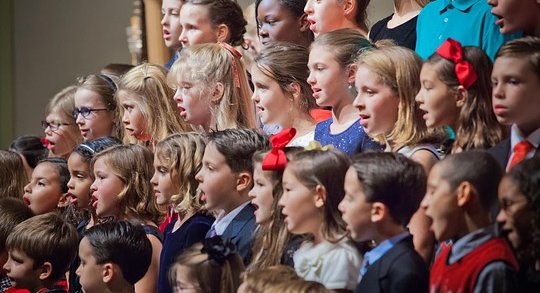
Singing may not be so much a natural talent as it is a learned skill—one that researchers say can decline over time if not used. The good news is that with lots of practice, just about anyone can become a better singer.
“No one expects a beginner on violin to sound good right away, it takes practice, but everyone is supposed to be able to sing,” says Steven Demorest, professor of music education at the Bienen School of Music at Northwestern University.
“When people are unsuccessful they take it very personally, but we think if you sing more, you’ll get better.”
Use It Or Lose It
Published in the journal Music Perception, a new study compares the singing accuracy of three groups: kindergarteners, sixth graders, and college-aged adults. One test asked the volunteers to listen to four repetitions of a single pitch and then sing back the sequence. Another asked them to sing back at intervals.
The groups were scored using similar procedures for measuring singing accuracy. Participants showed considerable improvement in accuracy from kindergarten to late elementary school, when most children are receiving regular music instruction.
But in the adult group, the gains were reversed—to the point that college students performed at the level of the kindergarteners on two of the three tasks, suggesting the “use it or lose it” effect.
Singing on key is likely easier for some people than others. “But it’s also a skill that can be taught and developed, and much of it has to do with using the voice regularly,” Demorest says.
“Our study suggests that adults who may have performed better as children lost the ability when they stopped singing.”
Tone Deaf
By eighth grade, only 34 percent of children in the United States participate in elective music instruction, Demorest says. That number declines as they move toward high school graduation.
Children who have been told they can’t sing well are even less likely to engage with music in the future and often vividly remember the negative experience well into adulthood. Being called “tone deaf” can have devastating effects on a child’s self-image, the researchers write.
In general, older children sing more accurately than younger ones. But there’s little or no data on children between 12 and 18 years old, an especially formative period, when voices change and there’s high interest in concerts and other forms of musical expression.
Researchers cannot rely on a universal definition of what constitutes accurate singing; no reliable measure exists.
To overcome this problem, Demorest and study coauthor, Peter Pfordresher, director of the Auditory Perception and Action Lab at the University at Buffalo, have spearheaded an effort to create an online measure of singing accuracy. Music teachers will be able to use the tool to help struggling children, and adults can test their singing ability.
Called the Seattle Singing Accuracy Profile (SSAP), the tool would standardize the way singing is measured so that researchers can compare their results across multiple studies and build a clearer picture of the causes of inaccurate singing, Demorest says.
“We first need to understand what is ‘normal’ in terms of age-related singing development. What can we expect from a 5-year-old? A 10-year-old? Once we know that, we can identify areas where children are struggling and provide them with resources.”
Better data could also be used to determine whether an inability to imitate certain pitches is linked to communication deficits or language impairments. Only a tiny subset of the population is truly tone deaf (a condition known as amusia), which means they can’t hear most changes in pitch. For these people, singing becomes difficult.
Ironically, singing can serve as a barrier to other musical activities, Demorest says.
“So much of elementary school music revolves around singing, but that’s only one way to measure musicality. Everyone should be able to have music as a part of their life. It’s OK to select out of it, but it should be by choice, rather than because you think you don’t have ‘talent.’ And if at any point in life you decide to become more engaged, you can be.”
Source: Northwestern University
About the Authors of the Study
Steven Demores is professor of music education at the Bienen School of Music at Northwestern University, University at Buffalo. Peter Pfordresher, co-author of the study, is director of the Auditory Perception and Action Lab at the University at Buffalo. The Society for Research in Music Education and the National Association for Music Education funded the study.
Related Book:
at

Thanks for visiting InnerSelf.com, where there are 20,000+ life-altering articles promoting "New Attitudes and New Possibilities." All articles are translated into 30+ languages. Subscribe to InnerSelf Magazine, published weekly, and Marie T Russell's Daily Inspiration. InnerSelf Magazine has been published since 1985.

Thanks for visiting InnerSelf.com, where there are 20,000+ life-altering articles promoting "New Attitudes and New Possibilities." All articles are translated into 30+ languages. Subscribe to InnerSelf Magazine, published weekly, and Marie T Russell's Daily Inspiration. InnerSelf Magazine has been published since 1985.






















